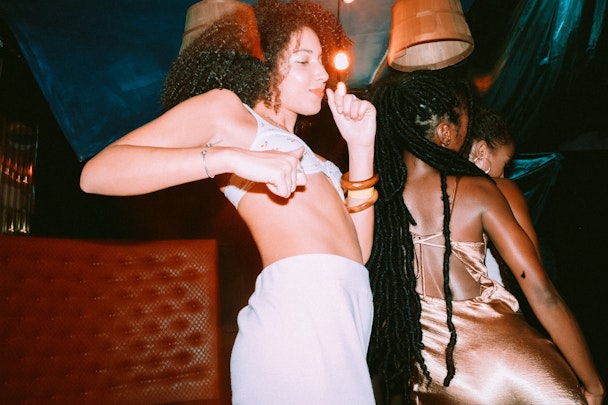In creators we trust: on Gen Z’s loyalty to influencers
What fuels Gen Z’s affinity with influencers? Ellie Barber of youth marketing agency Nerds Collective chimes in with insights from its consumer-led intelligence platform.

Gen Z’s love for creators is rooted in aspiration and connection / Frankie Cordoba
With the beauty-led TikTok trend ‘de-influencing’ getting people talking, discourse around the longevity of influencer marketing has resurfaced. The #deinfluencing tag has over 200m views on the app, with some creators positioning it as a reaction to overconsumption while others have used the opportunity to steer people away from viral (and often expensive) products.
While it initially seems like a rebellion against traditional influencer promotion, creators are also using it to suggest alternative, cheaper ‘dupes’. That said, a comment on one particular post calling for people to ‘save money and lower consumption’ asks, “where are those pants from????” It seems the desire to be influenced persists.
Advertisement
Identity
At Nerds, whenever we speak to our community, we consistently hear of their love for influencers. According to a style and social media survey from our consumer-centric cultural intelligence platform, when looking for style inspiration, 45% of European Gen Zs want brands they’ve seen an influencer or celebrity wear, while just 18% want brands their friends wear.
While Gen Z wants to feel unique and stand out, they also seek reassurance. Their peer groups shape their cultural references; fitting in is a priority. But there’s a delicate balance between demonstrating they understand what’s culturally relevant and outright copying their friends. Here is where influencers come in. A trusted voice, cultural insiders represent their interests and can introduce them to the style, music and ideas that will help them shape their identity.
Perpetually online, Gen Z are inherently trusting of social media personalities. TikTok has usurped Google as their search engine, and they turn to social media for guidance on everything from style and news to restaurants and even money. In fact, Gen Z are five times more likely than over-40s to turn to social platforms for financial advice.
As well as education, we know from our community that browsing creator content is a form of entertainment and aspirational window-shopping. 73% of European Gen Zs say they like looking at products online even if they can’t afford them.
Advertisement
A love story
The trust Gen Zs place in influencers can create parasocial relationships. In traditional media such as film, this is where the audience becomes attached to a fictional character; on social platforms, it’s easy for followers to feel closely connected to the people whose lives they’re welcomed into.
With Gen Z experiencing increased rates of loneliness, these relationships can offer connection, companionship and aspiration, highlighting the value this audience can draw from online interaction. For brands, acknowledging this is one part of developing a sustainable and impactful influencer marketing strategy.
As Gen Z develops higher levels of cultural affinity and familiarity with the creators they connect with, they are much more likely to spot when an influencer doesn’t back the product or brand they’re working with. The deinfluencer trend highlights how creators will prioritize protecting their personal platform and communicating trustworthiness over an unquestioning deference to any given brand.
Suggested newsletters for you
Gen Z loves a good collaboration
The partnerships that work well and resonate are those where the brand and creator are a logical fit, ensuring recommendations feel sincere. Take JD Sports’ YouTube content as an example. Partnering with creators like Chunkz and Chloe Burrows, the brand and influencers have naturally overlapping audiences and their styles and personalities are aligned.
The output is authentic and engaging; the brand has worked collaboratively with the creators, giving them creative freedom and the ability to maintain their tone of voice, ultimately delivering content the audience wants. By leveraging the existing community these creators have, JD is able to develop its own connections with its consumers.
What next for the creator economy?
What the popularity of the deinfluencing trend highlights is Gen Z’s desire for honesty and integrity from the personalities they connect with online. Knowing that influencer recommendations are key to this audience, there’s no danger to the continued power of online creators.
The message it sends to brands is to ensure they are contributing to a spirit of authenticity and honest promotion, respecting the communities creators and their audiences have built together. In doing this, brands can create a point of connection not centered on the product alone – hopefully, safeguarding themselves from the next anticonsumerism TikTok trend.
Content by The Drum Network member:

NERDS Collective
NERDS Collective was founded by Luke Hodson In 2013 as a specialist agency that places brands at the frontline of street culture through hyper-nuanced consumer insights,...
Find out more
